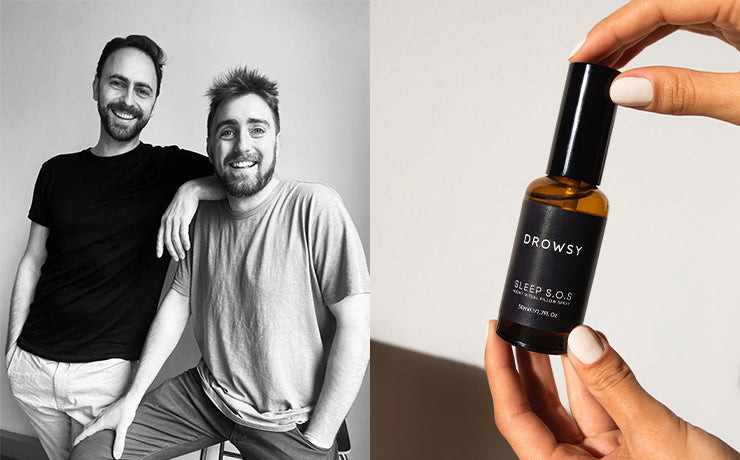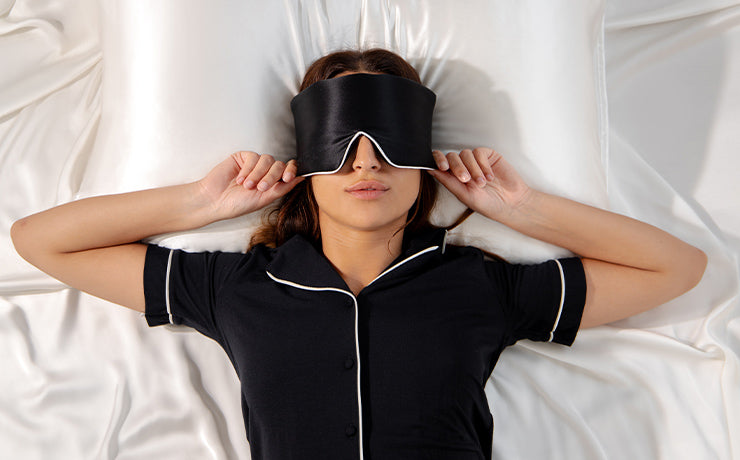Sleep Philosophy
The Drowsy 3 Pillars of Sleep
The steps that helped us reclaim lost sleep:
Approved by Sleeptrust.
- Practicing nightly wind-down rituals.
- Creating a good sleeping environment.
- Maintaining healthy sleep habits.
BEDTIME RITUALS
All too often we rush through the day with a million things on our mind, come home exhausted, open a bottle of wine, switch on the TV and then drag ourselves off to bed at the last minute. When we hit the pillow, our minds are still racing because we haven’t given ourselves time to wind down properly. This means you end up taking your mental stresses to the bed with you. It also means that you don’t give your brain and your body time to prepare psychologically for sleep. Instead, you hit the hay in a state of over-stimulation.
We are creatures of habit. By doing the same thing repetitively every night you can train your body to respond to psychological cues and let it know that sleep is coming. By practicing a good bedtime ritual, you will also give yourself time to switch off the stress of the day and mentally prepare for deep sleep. Research has shown that implementing a good sleep ritual in your life can drastically reduce the risk of sleep disorders like insomnia.
Our sleep coach Michael Hildebrandt recommends allowing at least 1 hour to wind down before bed. These are his top 5 steps for building an effective bedtime ritual:
- Writing in a journal
Start by spending 10 minutes to write down a short summary of your day. Include your main issues, stresses and worries. Then write down your main objectives for the following day, with any concerns you have or things that you need to overcome. Getting things down on paper is a physical act of dealing with the things that are on your mind. By writing them down you can clear your head and free it up for relaxation.
- Have a hot shower
A hot shower is a great way to ease stress and muscular tension. Whilst the cooling down process afterwards helps to prepare your body for sleep.
- Practice bedtime yoga or light stretching
Yoga helps to release toxins stored in organs and body tissue. The flow of movements combined with breathing techniques is a great way to calm and clear the mind. Finally, by stretching the body you can ease muscular tension and pains that get in the way of sleep. Light exercise is also a proven way to improve sleep quality.
- Use relaxation breathing techniques
Utilising the right breathing techniques with a relaxation intention can help you fall asleep faster and feel calmer in the process.
Michael recommends using either the 4-7-8 or the synchronous breathing method. Check them out here --> https://www.sleeptrust.eu/top-2-breathing-methods/
- Read, or listen to a sleep meditation
Reading or listening to a guided meditation as a final step before sleep is a great way to clear the mind and ready you for sleep. So rather than lying there waiting to drop off you let your mind slowly drift.
Sleeptrust bonus tip:
Go to bed with intention to rest rather than intention to fall asleep. Sleep is an unconscious process, out of our control. Trying to control something uncontrollable builds up pressure and stress. Instead, acknowledge that you had a hard day and a lot of stress and now it’s your time to wind down and relax. Nothing else. Using the drowsy pillow spray is a fantastic way to do this. You are giving your brain the unconscious signal that you deserve to rest and that you value your sleeping environment. The scent will also help to trigger feelings of relaxation, and when you have relaxation under control, sleep will take care of itself.
ENVIRONMENT
We are huge advocates of sleep being about relaxation. This is YOUR time. It is a time for therapy, to switch off from the world and recharge. There is no better way to put yourself in a relaxation mindset than by creating an environment that makes you feel relaxed. There are lots of easy hacks to help make your sleeping environment more relaxation oriented, but it is also worth investing in some key materials to ensure that you create a proper zen den.
These are Michaels top 5 tips for creating an optimal sleeping environment:
- Mood
Creating the right mood in your bedroom is essential to help you feel peaceful and calm which will in turn help sleep come more easily. Do it with lighting, music and scent to relax your senses from multiple angles. Exposure to light at nighttime can directly interfere with your body’s circadian rhythm, so it’s important to set the scene with low lighting. Relaxing music can have a direct effect on the parasympathetic nervous system, which helps your body relax and prepare for sleep. And finally, scent has been proven to trigger olfactory sensors in the brain which releases chemicals in your brain to affect your mood.
- Comfort
If you don’t feel comfortable in bed, then you won’t be able to relax. As relaxation is the pathway to dropping off, we think this is the one area that is highly worth spending some money on. Make sure you get yourself a really good mattress, pillows and duvet/bedsheets. These will carry you through many nights, so they need to be right.
- Temperature
Overly hot, cold or draughty rooms can really affect your sleep. Bear in mind that your body temperature will peak in the evening and then drop once you are asleep. Each person is different, so we recommend that you really think about your temperature and make sure you have the right blankets, socks and airflow to keep yours well regulated.
- Sound and light
External light or sound will interrupt your sleeping patterns and make it harder to achieve deep and rested sleep. Make sure you have good curtains to block out external light and use a white noise machine if outside noise is disrupting your sleep.
- Tidiness
Studies have shown that people who sleep in cluttered rooms find it harder to get to sleep than those who sleep in tidy rooms. The key here is that your room is your relaxation sanctuary. You have to enjoy being in there, so make it as zen as possible by keeping it tidy with clean sheets on the bed.
Sleeptrust bonus tip:
Listening to binaural beats are thought to generate slower frequency brainwaves that promote deeper states of relaxation. Studies have shown that listening to them has been associated with changes to the levels of hormones DHA, cortisol and melatonin in the brain. These are key in the function of sleep and well-being. Try playing binaural beats as low background music in the build-up to bedtime.
HEALTHY SLEEP HABITS
To follow a sleep-focused lifestyle, it’s essential to make sleep a priority in your daily life. Unless you are consciously practicing healthy sleep habits, you can’t expect to start getting true restful sleep.
These are Michaels 5 essential healthy sleep habits:
- Avoid screens
We all know it. Blue light is extremely disruptive to your circadian rhythm. Using TVs, tablets, smartphones, laptops, or other electronic devices before bed suppresses the release of the sleep-inducing hormone melatonin and makes it harder to fall asleep. Furthermore, these devices entertain our minds leaving no room for our mind to reflect on the day. Negative emotions or a racing mind in bed can be the unpleasant consequence. Therefore, avoid usage one hour before you go to bed.
- Wake up using an alarm clock that is synched to your biorhythms.
Every night we go through an average of 5 sleep cycles. Each cycle contains light sleep stages and deep sleep stages. Using a conventional alarm clock will rip you out of sleep whatever stage you are in, which could be deep sleep. If that happens you will feel sluggish for the rest of the morning. Use a fitness tracker or a light-based alarm clock which has the ability to wake you up when you are in a light sleep stage. This will make it easier to get up and feel good in the morning.
- Follow good sleep hygiene practices.
Learn to avoid caffeine, alcohol, tobacco and heavy meals in the run up to bed. Your body is extremely responsive to any stimulants that you put into it, so cut out things that could interfere with the chemical and hormone balance in your brain needed for normal sleep.
- Try using cognitive behavioural therapy (CBT) techniques.
CBT is one of the most effective solutions for treating insomnia. It can take several weeks for the effects to begin to show, but it is worth it. CBT involves bringing methodical habits and techniques into your life to improve your sleep. This may include; stimulus control, sleep restriction, following strict patterns, and relaxation training. If you want to find out more, seek help with a professional sleep coach like Michael Hildebrandt!
- When you wake up in the night, don’t check the time.
We naturally wake up, up to 20 times during the night, mostly only for a couple of seconds in order to move. Seeing the time creates an awareness which produces stress. This makes it harder to fall back to sleep. So instead of checking the time, keep breathing and focus on relaxation.
Sleeptrust bonus tip:
Plan your day. Good sleep starts in the morning and runs over the course of the entire day. Planning what you want to do for your well-being, fun, your relationships and work will set you up to experience and achieve what is truly important for you. A peaceful sleep in the evening is the result of a well lived day, and that starts in the morning.




